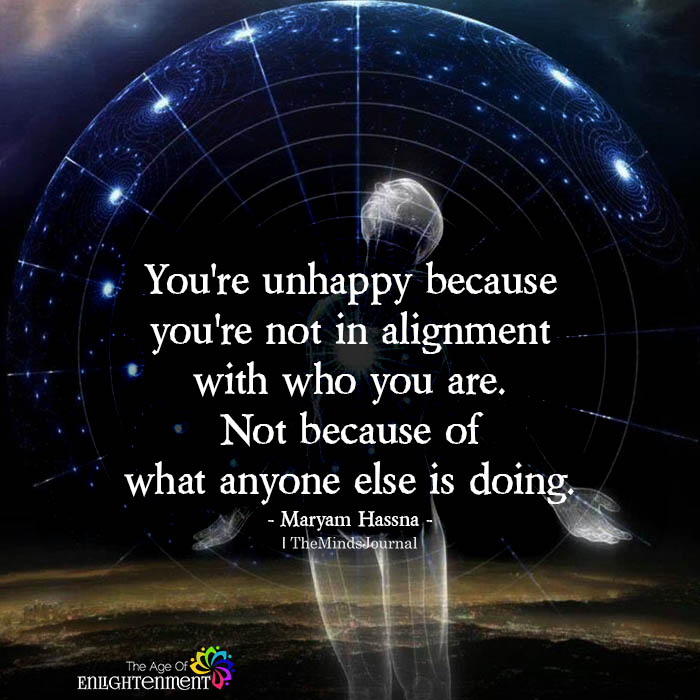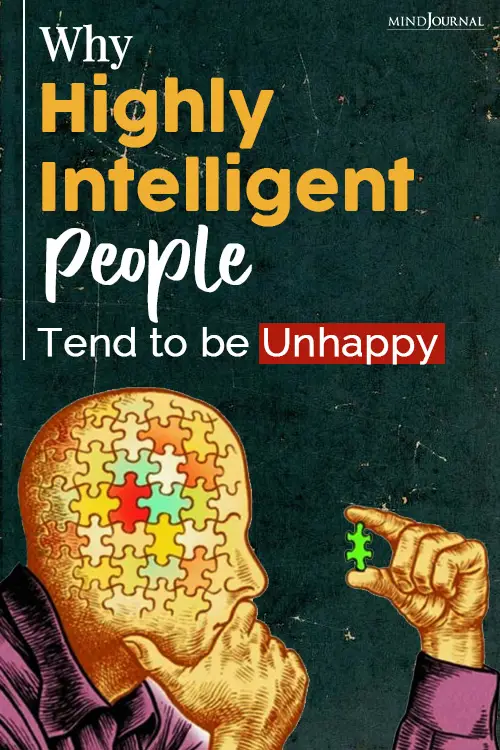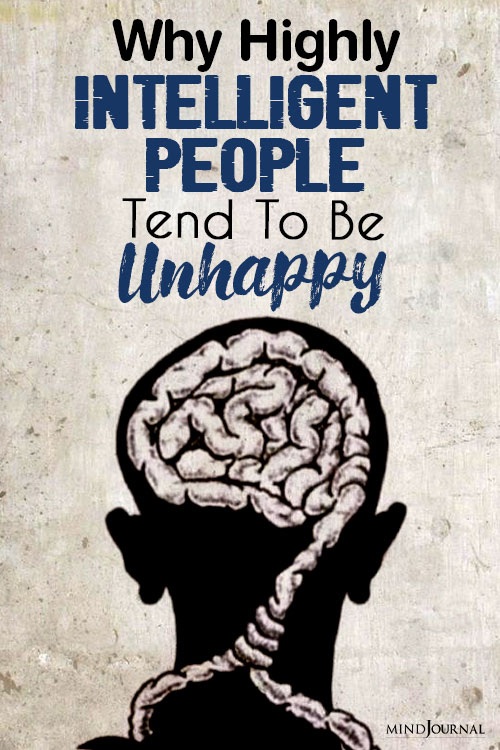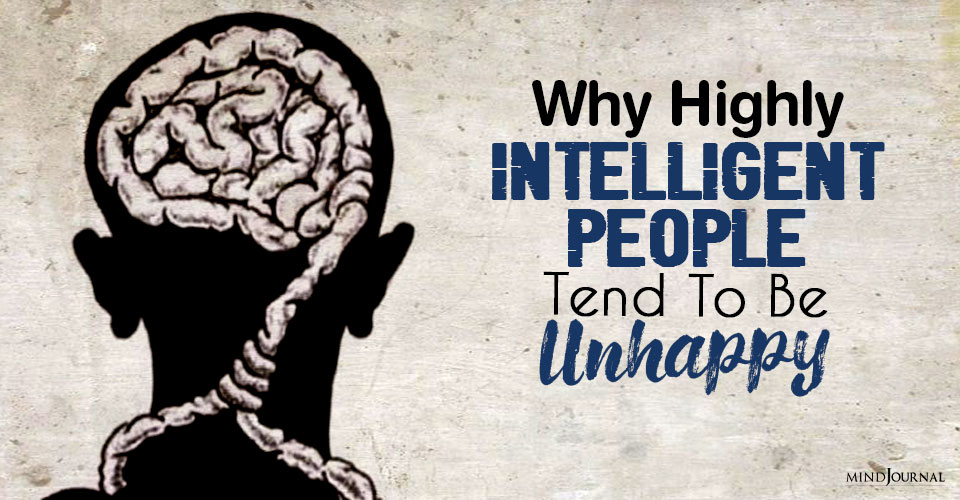Intelligence and happiness: Is high intelligence a curse? Well, it seems so. Experts have observed that highly intelligent people are more likely to be depressed and live miserable lives. But why intelligent people are unhappy?
Although they may have a successful career and a loving family, it has been observed that smart people are usually more stressed & worried and less happy than the average person. It has been common knowledge for a long time that deep thinkers tend to look for happiness the hardest without any success.
A high level of intelligence can be rather crippling for most people on an emotional level as they are the ones who are the most lonely and less satisfied.
Are Highly Intelligent People Unhappy?
Knowledge has its own pros and cons. Intelligence can certainly bring you a lot of success, reputation, recognition, and social admiration. However, it takes more than that to be happy in life.
Happiness refers to a wide array of positive emotions characterized by contentment, joy, gratitude, general well-being, and purposeful life. However, deep thinkers and highly intelligent people have a unique understanding which handicaps them as they overanalyze every situation in life. As they look at life differently, they often realize there is more to life than mere success, recognition, and having a loving family. And this is what leaves them feeling unsatisfied and unhappy. This is why intelligent people are unhappy.
Read: 7 Struggles Of Highly Intelligent People
Raj Raghunathan, professor of marketing at The University of Texas at Austin’s McCombs School of Business and author of ‘If You’re So Smart, Why Aren’t You Happy?’ explains that a habit of overthinking is commonly observed in smart and successful people. As they are overthinkers, highly driven, and expect the best from every situation, they subconsciously prevent themselves from being happy.
Moreover, they also commit certain “happiness sins”, such as not making happiness a top priority, which leaves them feeling unhappy. But are they truly committing happiness sins? Or have the highly intelligent realized that life is meaningless and depressing, something most of us average Joes haven’t figured out yet? According to Raghunathan, there might be some truth to that.
He says, when something good happens to us we may experience momentary happiness. For instance, when we get a raise at work, we will become happy for a certain period. But eventually, we will get used to our increased salary and require further hikes at regular intervals to experience the same levels of happiness in the long run. He explains this is not necessarily a practical and sustainable source of happiness for most of us. This is where the first noble truth in Buddhism comes in, which explains that suffering is an inherent part of life and existence.
Intelligence And Depression
Research indicates that people with higher IQs are more prone to mental illnesses, like bipolar disorder, mood disorders, depression, and anxiety disorders. In fact, it has been also observed that highly intelligent children are prone to experiencing childhood depression. According to one study by researcher Ruth Karpinski from Pitzer College, which surveyed over 3700 members of Mensa, a high IQ society, highly intelligent people are at high risk of psychological vulnerability, proving the notion that indeed intelligent people are unhappy.
The survey, which covered various aspects including mental health, revealed that the highly intelligent members of the society were at higher risk of suffering from various psychological and physiological disorders. This might mean that a high IQ can make you less happy.

The survey found that mood disorders & anxiety disorders were very common among the members of Mensa, who have an IQ in the top 2%. The findings revealed that around 10% of people with average intelligence have some mood disorders and anxiety disorders. On the contrary, about 27% of Mensa members suffered from a mood disorder like bipolar disorder or severe depression; and approximately 20% of the members had an anxiety disorder. All these statistics indicate the grim reality that intelligent people are unhappy.
Read: 7 Reasons Why Highly Intelligent People Struggle To Find Happiness In Life
Why Highly Intelligent People Are Unhappy?
Now that we know that smart people tend to be deep thinkers and are more likely to suffer from various mental health issues, let’s explore some of the most prominent reasons why intelligent people are unhappy and unsatisfied in life.
1. The Dunning–Kruger effect
According to psychology, the Dunning–Kruger effect is a cognitive bias that makes intelligent people smart enough to realize how little they know about everything. It’s a psychological trick where the more knowledge we have about something, the less confident we feel about our mastery over that topic. Conversely, individuals who don’t possess little knowledge about something, usually feel overconfident about their abilities and competence.
In simpler words, dumb people don’t realize that they are dumb and smart people doubt how much they know. Hence, due to the burden of intelligence, intelligent people are unable to appreciate themselves and feel generally unsatisfied with their accomplishments. This can be one reason why intelligent people are unhappy.
Related: Take this perfectionism test to know whether you strive for perfection and to what extent!
2. Mental Health Issues
Loneliness and isolation are also reasons why intelligent people are unhappy in their life. Highly intelligent people are usually more depressed and feel lonelier than people with average intelligence. As we have seen from the studies mentioned above, individuals with higher intellect are more likely to have various mental disorders and hence feel more unhappy with their lives. Moreover, they also tend to be lonelier than most other people.
In a Washington Post article, researcher Carol Graham from the Brookings Institution explains “Those with more intelligence and the capacity to use it… are less likely to spend so much time socializing because they are focused on some other longer-term objective.” Hence, smarter people often tend to isolate themselves from others as they don’t prefer wasting their time or energy on socializing which leads to further depression. In fact, they might even feel happier being alone than socializing.
3. Inability To Express Emotions
Conveying our feelings and expressing our emotions are crucial for our mental and emotional health. Unfortunately, being highly intelligent doesn’t necessarily mean having higher levels of emotional intelligence (EI). Emotional intelligence is the ability to understand and regulate our emotions and realize how they might affect others. However, it has been observed that highly intelligent people often lack the ability to express their feelings, emotions, needs, and desires, and this might be the reason why intelligent people are unhappy.
Read: Mood Disorders Are The Price Paid By The Highly Intelligent And The Creatives
4. Boredom
Boredom could very well be another reason why highly intelligent people are unhappy in their lives. As their minds tend to be highly active, it becomes challenging for them to keep their interest in a particular topic sustained for a long time. Hence, they tend to get bored easily.
As they are constantly driven by newer and greater ideas, they keep moving from one project to another, without completing the previous ones most of the time. This often leads to a lot of dissatisfaction and this is why highly intelligent people are miserable.
5. Overthinking And Overanalyzing
From anxiety disorder to depression, highly intelligent people often suffer from a number of psychological problems due to their tendency to ruminate and think too much. As smart people are usually perfectionists, they overanalyze and overthink every aspect of their work and life which can often adversely affect their productivity, decision-making abilities, and mental peace. It is not surprising that intelligent people are unhappy due to their overactive minds. In other words, the higher your IQ the more unhappy you are.
Related: Did you know the reason why we can’t let go of someone is because deep inside we still hope?
6. Excessive Stress
Why intelligent people don’t find happiness? Unnecessary stress is another reason why intelligent people are unhappy. Individuals with higher intelligence often experience more stress than average people as they look at even the most mundane tasks differently. Due to their tendency to overthink, they often look at the negative aspects of simple daily activities and experience chronic stress even when they don’t have to.
What Can You Do To Be Happy?

Although most highly intelligent people tend to be unhappy and unsatisfied with their lives, there are some smart individuals who are able to live fulfilling and purposeful lives. So if you can relate to most of the reasons mentioned above and believe that you are smarter than the average Joe, then there’s still a chance that you can turn your life around and experience joy, positivity, and happiness. Yes, intelligent people are unhappy, but there can be exceptions too!
Professor Raj Raghunathan believes the key is in identifying what these happier segments of intelligent people are doing differently. He says, “Once you start a serious enquiry into that question, I think you’ll discover that they do two things that are different. First, they seem to pursue a different set of goals: goals that are more conducive to enhancing happiness – like prioritising relationships over status, or experiences over material possessions.”
But that’s not all. Raghunathan adds “Second, you discover that their attitude to life is different. They are somehow better able to roll with the punches. This attitude is rooted, in my view, in an implicit belief that life is good, and that good things are going to happen to you – what I call an ‘abundance mindset.’ The good news is that both of these things can be learned. And the better news is that adopting these things will actually not just make you happier, it will also make you a better human being.”
Read Surprising Downsides of Being Highly Intelligent
Change Your Attitude

Feeling unhappy with life is normal as you go through the ups and downs of life, whether you are highly intelligent or just about average. What is important is that you change your perspective and attitude about life and start seeing things differently.
Developing a positive and abundant mindset can help us not only succeed in our career and work, but also build more meaningful relationships leading to a happier and better life.
Frequently Asked Questions
What is a highly intelligent person?
A highly intelligent person thinks before speaking, has a good grip on their emotions, can adapt to new ideas or changes and is flexible in their thought process.
How can you tell if a girl is intelligent?
If a girl can form her opinion, manage her finances, feels confident about herself, can keep calm during crisis, and wants to be successful in life, it means she is intelligent enough.
What is the difference between smart and clever?
The main difference between smart and clever is that being clever involves originality or ingenuity. A sharp-looking person can also be described as smart.
Reference: 1. http://cf2.org/docs/misc/raj.pdf 2. https://www.ncbi.nlm.nih.gov/pmc/articles/PMC3705611/ 3. https://www.ncbi.nlm.nih.gov/pmc/articles/PMC3269637/ 4. https://www.sciencedirect.com/science/article/pii/S0160289616303324# 5. https://www.ncbi.nlm.nih.gov/pmc/articles/PMC3356869/ 6. https://www.ncbi.nlm.nih.gov/pmc/articles/PMC2702783/ 7. https://www.ncbi.nlm.nih.gov/pmc/articles/PMC4339075/ 8. https://www.ncbi.nlm.nih.gov/pmc/articles/PMC7734327/ 9.https://www.sciencedirect.com/science/article/abs/pii/S0191886914005558#:~:text=However%2C%20verbal%20intelligence%20was%20a,underlie%20emotional%20disorders%20are%20discussed













Leave a Reply
You must be logged in to post a comment.